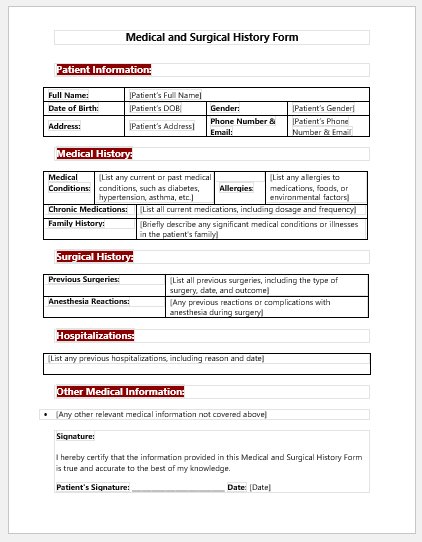A patient either in the outpatient or inpatient department undergoes several questions, from his presenting complaints to his history of ailments and drug intake. These questions are really important to know because a doctor is very interested in knowing the details of everything that has happened to his health in any form.
Why is history asked and maintained in this form?
But why does a doctor want to know the history? One may ask this question, especially if he is coming to the hospital for apparently trivial reasons. The answer to this question is very simple, yet it can take a long time to complete. The reasons can be explained in the following paragraphs.

Sample Form
Medication history
When you are asked if you are currently taking any medicine for any specific illness or reason, he wants to know because many drugs, when combined, may interact and prove harmful. So, by any means, if you are taking any drugs and the drugs the doctor is going to prescribe may interact with that, he will need to change the medicine or change the regime or routine.
If you are allergic to certain chemicals or drugs, he will avoid using them on you and will notify the other health professionals as well.
Medical History
It is an undeniably important question in the history-taking process. A patient is asked about his current and past medical illnesses and wants to know the nature of his present complaints and find out any association with the past.
This is again a very important part of history, and ignoring or forgetting this is no less than a crime. A person can be allergic to a drug that is likely to be prescribed, leading to a life-threatening situation rather than a life-saving one. Allergy to blood transfusions is also important to ask.
A person with known systemic diseases is very important to know, like diabetes, hypertension, cardiac, respiratory, and renal diseases, because it changes the overall management plan of the patient. Similarly, past medical history in the family is also inquired about because, even if the patient is not currently suffering from them, he still has a higher chance of developing them than other populations.
Surgical History
Surgical history is important for the same reasons. If a person has to undergo another surgery, his doctor already knows what he has undergone in the past and what he should expect from his future surgery. What careful measures are to be taken this time to avoid possible complications, and how did the process of anesthesia go in the past?
History of Allergies
All the above reasons make it mandatory for a health professional to ask about past medical, surgical, medication, and allergy histories religiously. There is no excuse for these actions, and the patients must also cooperate with their doctors in this regard.
After all, we come to the hospital for a complete and reliable treatment rather than a hit-and-run and bad outcome concerning our health.
- Mental Health Evaluation Forms
- Forms Used by Pediatricians
- Various Forms Related to Pregnancy Verification
- Common Forms Used by ENT Specialists
- Pain Diary Worksheet Template
- Forms Commonly Used by Old Age Homes
- Medical Treatment Consent Form
- Home Exercise Program Worksheet
- Forms Used for Mental Health Assessment
- Forms Used by Psychologists
- Medical Forms Commonly Used by/for Students
- Assessment Consent Form
- Forms Used by an Anesthesiologist
- Not Fit to Fly Certificate Template
- Home Visit Consent Form for Schools